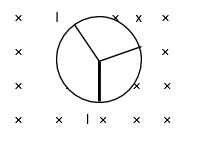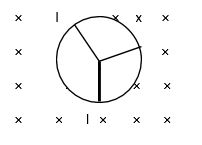Question
Question: A conducting wheel rim in which there are three conducting rods of each length l is rotating with co...
A conducting wheel rim in which there are three conducting rods of each length l is rotating with constant angular velocity ω in a magnetic field B as shown in figure. The induced potential difference between its centre and rim will be:

A. Bωl2
B. 23Bωl2
C. 0
D. 2Bωl2
Solution
The induced potential difference in a closed loop is equal to the time rate of change of magnetic flux through the loop. The magnetic flux is the product of the magnetic field and area of the loop.
Complete step by step answer: In a magnetic field B, a conducting wheel rim in which there are three conducting rods each of length l is rotating with constant angular velocity ω. As a conductor i.e., conducting wheel is placed in a magnetic field, a certain number of magnetic lines are induced inside the conducting wheel which is passing unit area normal to their direction. This is known as magnetic flux density inside the conducting wheel or magnitude of magnetic induction. The magnetic flux (φ) is numerically equal to the product of magnetic field (B) and area through which the magnetic lines are crossing (A). So, an emf is induced in this wheel due to the change of magnetic flux.

The induced emf (potential difference) in a closed loop i.e., conducting wheel is equal to the rate of change of magnetic flux through the conducting wheel rim i.e.,
emf=tϕ [time is t]
emf=tBA
emf=tB×πl2 [A=πl2 where l is the radius of the wheel]
emf=ω2πB×πl2 [t=ω2π]
emf=2πB×πl2×ω=2Bωl2
Hence, the induced potential difference between centre and rim is equal to 2Bωl2 .
Therefore, option D is correct.
Note: The induced emf or potential difference between the centre of the wheel and rim is the same for each of the conducting rods. Each rods are of length l which indicates that rods are the radius of the wheel.
